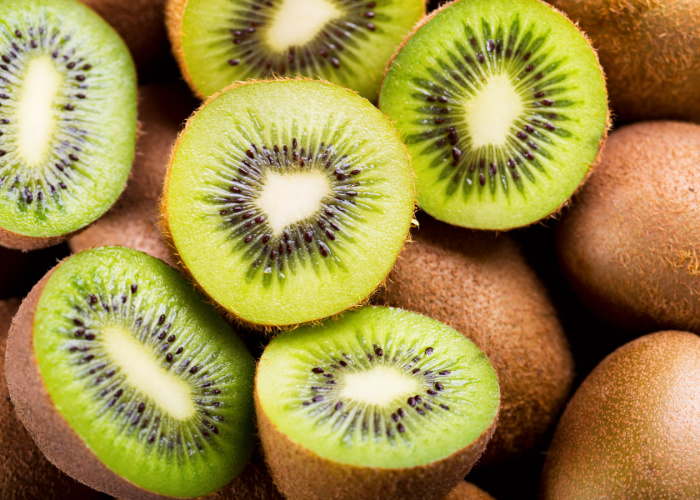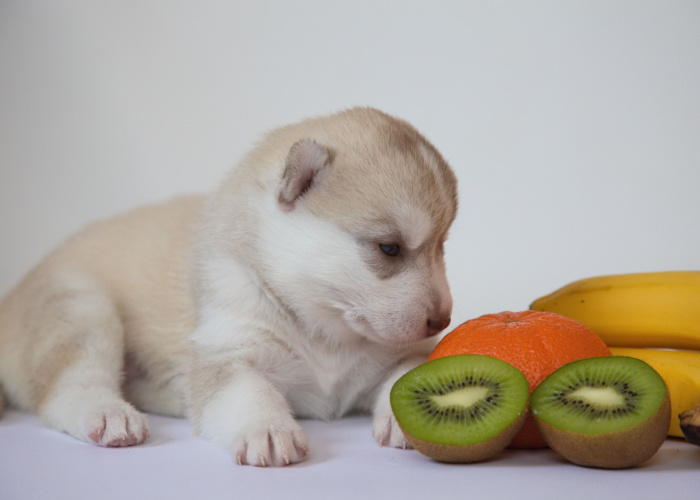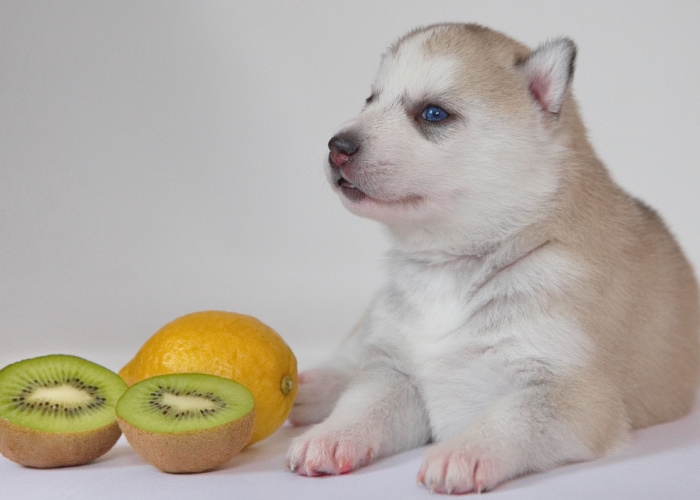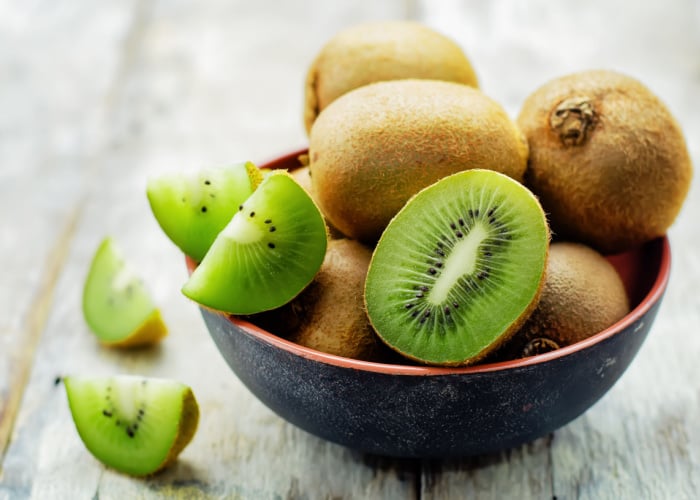
Table of Contents
If you’re asking yourself, “Can dogs eat kiwi?” you’re about to learn everything you need to know.
To start off, yes, dogs can safely eat kiwis.
It's a popular fruit worldwide that is low in calories and high in vitamins, folate, and potassium.
AKC says:
Feeding your dog kiwi should be considered a treat and not a substitute for foods that are more nutritious for pups.
Remember that kiwis and other fruits we discussed in other articles should not replace a well-balanced dog diet.
While this delicious and tangy fruit is not considered toxic to your woofer, there are a few precautions to take before sharing it.
In this article, you’ll learn how to safely feed your dog kiwis and its risks and nutritional benefits.
Here's a quick navigation:
- Can Dogs Eat Kiwi?
- Is Kiwi Safe For Dogs?
- Is Kiwi Bad For Dogs?
- Risks Involved With Giving Dogs Kiwi
- How To Serve Kiwi To Dogs
- Benefits of Feeding Kiwi To Dogs
- Can Dogs Eat Kiwi Seeds?
- Can Dogs Eat Golden Kiwi (Or Gold Kiwi)?
- Can Dogs Eat Kiwi Berries?
- FAQs
Can Dogs Eat Kiwi?
Luckily, kiwi is one of the nutritious fruits that we may give to our furry friends.
Kiwi contains an abundance of vitamins, minerals, and other necessary nutrients.
However, much like the other fruits we covered in other articles, your dog should consume kiwis in moderation.
We can only give it as an occasional treat.
Treats aren't meant to be a significant source of nutrients for your dog.
Most of their calories or nutrients should still come from their normal diet.
As always, before introducing any new foods to Fido's diet, seek advice from your vet.
Fun fact: Both potassium and vitamin C are higher in kiwis than in bananas or oranges.
Is Kiwi Safe For Dogs?
Yes, kiwi is considered to be safe for dogs.
Since kiwi is a nutrient-rich fruit, it includes a lot of vitamins and minerals that are great for your furbaby.
Kiwis are rich in vitamin C, potassium, copper, lutein, and beta-carotene.
They're full of fiber as well, which is excellent for your dog's digestive tract.
Fido's gut frequently has good bacteria that break down fiber into fatty acids.
Thus, this fatty acid helps the colon heal from injuries and limits the formation of harmful microorganisms.
However, because kiwis contain a lot of natural sugar, we still do not advise giving your dog much of them.
We recommend to steer clear of sweet fruit as a treat if Fido has diabetes or is trying to lose weight.
SUGGESTED READ: Dog Diabetes Diet: Vets Guide on What to Feed a Diabetic Dog
Is Kiwi Bad For Dogs?
There is a potential that a new food will upset Fido's stomach when added to his diet.
For this reason, we suggest starting with minimal doses of kiwi.
This will let you know whether your dog is allergic or intolerant. So make sure to monitor his reaction.
Dogs may not necessarily be allergic to kiwi, although some may appear to be more sensitive than others.
Even if everything’s good and your woofer loves them, still don’t make kiwis a regular treat.
Your dog should not eat fruits regularly but rather as a treat on exceptional occasions.
Risks Involved With Giving Dogs Kiwi
Kiwis are a harmless treat for dogs, but excessive consumption of the skin and seeds can be dangerous for dogs.
The seeds contain a trace amount of amygdalin, which releases cyanide into the body.
Fact: Other fruits and plants, including cherries, apples, pears, almonds, elderberries, and clover, also contain cyanide.
A tiny amount of cyanide consumption can cause symptoms of cyanide toxicity, such as salivation, rapid or difficult breathing, and even convulsions.
Keep in mind that cyanide toxicity can be fatal in a matter of minutes.
A few kiwi seeds may not be dangerous, but if your woofer consumes many of them at once, he could get sick.
Even though the rough skin may not be toxic, little dogs still run the risk of choking.
If you see any of the following signs, stop giving your dog Kiwis:
RELEVANT READ: 10 Best Dog Food for Dogs With Diarrhea in 2023
How To Serve Kiwi To Dogs
Start offering your dog kiwi in small amounts to give him time to acclimate to the new nutrients and healthy components.
Fido's digestive tract might be harmed by sudden dietary changes.
Here are a few safe serving methods to prepare kiwis.
Don’t feed the whole kiwi
If dogs don't chew a whole kiwi before swallowing it, it can pose a major choking risk.
It's unlikely that smaller breeds of dogs would try to devour a kiwi whole.
If they do, eating that much fruit might upset their stomach.
What if I have a large breed? Will it be safe?
Larger breeds can still run the risk.
Always err on the side of caution, and it's best to break up food if you can't be sure your woofer will eat it properly.
The best you can do is cut the kiwis into bite-sized pieces if you truly want to share this healthy treat.
We recommend this for all dogs, no matter how large or tiny your dog is.
You can also make kiwi popsicles to keep Fido cool and hydrated if you want to share some refreshing summer treats.
Remove the skin
Although kiwi skin is theoretically edible, we do not advise feeding it to your dog.
It is fibrous and difficult to digest, and eating it may cause digestive distress.
The peel could create a choking threat for Fido if it gets lodged in his throat due to the fuzzy texture.
Additionally, there are microscopic calcium oxalate crystals on the skin that are spiky and might irritate Fido if consumed.
Your dog may get an itchy, swollen mouth.
Feed in Moderation
Always follow the 10% rule when deciding how much Kiwi to give your dog.
Although kiwi is a natural and nutritious snack, it is still considered a treat.
All treats, including fruits and veggies, should not exceed 10% of your woofer's daily caloric intake.
Overfeeding may result in obesity, which can harm your dog's health.
According to VCA Animal Hospitals,
Obese dogs develop an increased risk for cancer, diabetes mellitus, heart disease, hypertension, osteoarthritis faster degeneration of affected joints, urinary bladder stones, and anesthetic complications.
Benefits of Feeding Kiwi To Dogs
Your dog may benefit from extra vitamins and nutrients that their commercial dog food may lack if you occasionally give him a piece of kiwi.
What exactly are these minerals and vitamins?
Lutein
Did you know that lutein packs a powerful nutritional punch for your dog's eyes?
It is a carotenoid, which is a vitamin essential for dogs' eye health.
Since lutein is an antioxidant, it can help stop or delay the harm that free radicals do to cells.
Free radicals are dangerous, naturally occurring chemicals that are present in the body.
Are there any other foods that contain lutein besides kiwi?
Of course! Carrots, broccoli, eggs, and pumpkin are lutein-rich dog-safe foods that your furry pal will enjoy.
Vitamin C
Another essential antioxidant for your dog is vitamin C.
They need it to keep their coats shiny and healthy.
While proponents argue that healthy dogs often do not need vitamin C, sick or stressed animals may benefit from taking it.
Did you know that it also naturally strengthens the immune system?
As it is absorbed into the body, it raises the level of antibodies that defend against pathogens, germs, and viruses.
Additionally, it promotes collagen synthesis in our furry friends.
Collagen is a tissue that supports bone and joint health
Having adequate collagen in the body can prevent your canine friend from developing hip dysplasia.
SUGGESTED READ: 20 Dog Breeds Most at Risk for Hip Dysplasia
Calcium
Fido must have calcium in his body to function.
We know how important calcium is in forming and maintaining strong bones and teeth.
But calcium also serves additional purposes.
- Blood coagulation
- Muscle function and vision
- Nerve impulse transmission
Your dog's food should include plenty of calcium because it's essential for their healthy growth.
Without it, they run a very high risk of fractures and limb abnormalities.
Fact: Pregnant and lactating dogs also need significant calcium levels to support growing fetuses and make enough milk to nourish the liver.
Potassium
Potassium facilitates nutrient absorption and digestion in your dog.
It is an essential element that helps break down fats and carbs.
Additionally, it enhances your dog's cognitive abilities.
It immediately strengthens the neuronal connections between the brain and the rest of the body.
So, if your pup has a high level of innate intelligence, maintaining that intelligence will be made easier by having enough potassium in his body!
Can Dogs Eat Kiwi Seeds?
Once the seeds have been removed, dogs can eat bite-sized pieces of thin slices of kiwi fruit.
Even though kiwi seeds have a trace amount of cyanide, it would take a lot of them for your dog to get toxicosis.
A few slices won't contain enough seeds to endanger our canine buddies in any way.
RELEVANT READ: The Ultimate List of Toxic and Safe Plants, Seeds for Dogs
Can Dogs Eat Golden Kiwi (Or Gold Kiwi)?
Yes, dogs can eat golden kiwis or yellow kiwis.
They taste sweeter and have a different color from typical green kiwis, but they are essentially the same.
They still offer the same nutritional advantages and are completely safe for your woofer to munch on.
Can Dogs Eat Kiwi Berries?
Yes, dogs can benefit from the nutrients found in kiwi berry.
The high potassium content of kiwi berries contributes to the proper functioning of the muscles, heart, and nervous system in dogs.
Additionally, it contains a lot of lutein, an antioxidant that protects dogs' eyes from damage and supports eye health.
Can Dogs Eat Kiwi: FAQs
How much kiwi can I give my dog?
Your dog should be able to enjoy a few little bits of kiwi on occasion as a treat.
However, like with any new food, keep an eye out for stomach issues and stop giving your dog more kiwi if they start to act sick.
Remember to remove the seeds and peel because too much of either could be harmful.
Can dogs eat strawberries or kiwi?
If you’re snacking on a kiwi or strawberry, it’s perfectly fine to share with your dog.
Both fruits are nutrient-dense, which means they contain many vitamins and minerals that are beneficial for our animal companions.
Both of these fruits also contain natural sugar, so serve them in moderation.
RELATED: Strawberries for Dogs 101: Explaining All the Benefits
Can kiwi give a dog diarrhea?
Kiwi is a tasty fruit, but dogs may have respiratory discomfort, vomiting, and diarrhea if they eat the seeds.
Fido's diet may contain some insoluble fiber from the skin, but it could also cause severe diarrhea.
Therefore, you should avoid giving your dog kiwi if he has a history of stomach problems.
What are the benefits of eating kiwi?
Kiwis provide nutrients that are good for both humans and dogs.
It's 80% water, contains vitamins A, C, E, and K, and is, therefore, a nutritious treat for your dog.
These vitamins and minerals are crucial for having healthy skin and circulatory systems.
Is kiwi good for Shih Tzu puppy?
It's okay to share your kiwi with a Shih Tzu if you do so in moderation and remove the peel.
One-half of a kiwi, which has only 20 calories, makes a good serving.
This fruit is a wonderful option to include alongside other fruits in main meals to boost the amount of nutrients.

Can Dogs Eat Kiwi: Wrapping Up
As a rule, dogs can safely eat kiwis.
This tropical fruit is a great source of potassium and many vitamins.
Introduce it to your dog gradually, as you would with other treats, to prevent allergic responses and any stomach issues.
Never give your dog any kiwi fruit without first peeling the skin and removing the seeds.
Never give them the entire thing, either.
Despite the fact that it is a mushy fruit, Fido might attempt to eat it whole.
We advise trying different natural goodies if your dog doesn't react well.















